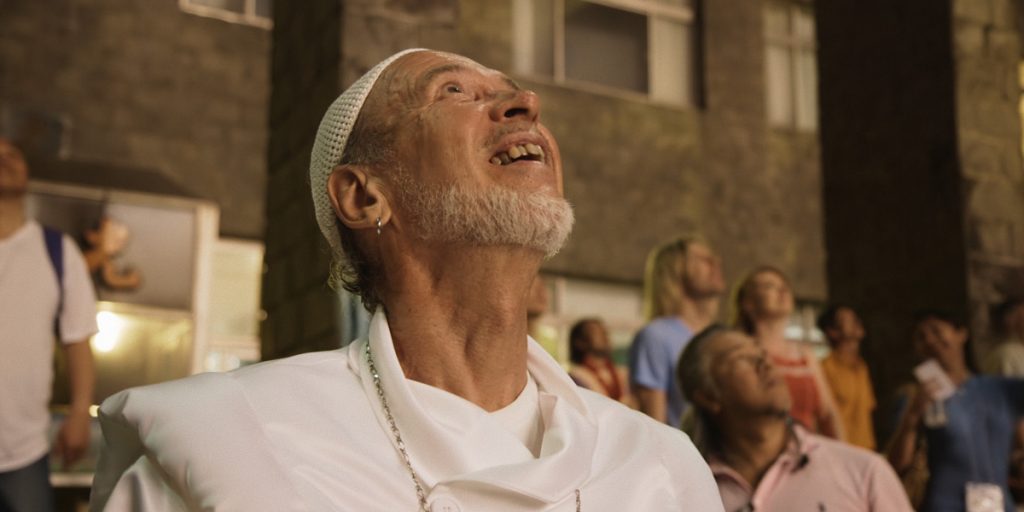Under the guise of a documentary with a bonkers premise, Yoav Shamir’s The Prophet and the Space Aliens is actually a thoughtful exploration on the nature of religion and believers.
“Be careful what you say, everything is recorded” notes Raël, the central figure of Yoav Shamir’s documentary The Prophet and the Space Aliens. It’s an interesting moment to have been recorded, as it echoes one of the main sentiments featured in the film: should we believe everything we’re told?
Born Claude Vorilhon, Raël is the religious leader behind Raëlism, a movement that believes human beings were created from extra-terrestrials known as the Elohim, a Hebrew word which means “those who came from the sky”. In the 1970s, Raël was visited by the Elohim, and over the course of six days they told him how they had created humanity, started all religions and wanted him to build an embassy for them to visit and reveal their truth to the world. On a second occasion, Raël visited the Elohim’s home planet, where there were exotic creatures, meetings with Jesus and other religious figureheads, as well as robots who cloned him perfectly.
Bonkers? Yes. Controversial? Yes. True? It’s here that Shamir’s film doesn’t take a firm stand, despite the director himself admitting to not believing a word of it. The documentary itself doesn’t seek to either discredit nor prove the beliefs of Raël or his 100,000+ followers. Instead, it explores the nature of Raëlism as a religion.
Raël talks about Christianity and Judaism, how they started with one person who simply had the ‘right teachings’. He talks of the prophets Mohammed and Jesus Christ, the latter of which he refers to as his half-brother. He talks of how it was him, specifically, that the Elohim trusted to deliver their truth. Shamir’s film intersperses this with testimony from both his followers and those who knew him before his close encounter. The former argue that his teachings have made them better people and promote love, acceptance and freedom of sexual expression. The latter note that Raël had always “searched for a way to make himself important.”

The film emphasises the work Raël does in Elohika, a Raëlian village in Burkina Faso. There, the inhabitants are all proud followers of Raël, who are encouraged to explore their pre-colonialism traditions in a manner not encouraged by, say, Catholicism or Islam. Who are encouraged to explore their sexualities in a manner, again, not supported by the likes of Catholicism or Islam. They have built a ‘Pleasure Hospital’, where the victims of FGM – female genital mutilation that, while illegal, is still common practice – can undergo surgery to repair their damaged bodies and experience sexual pleasure once again.
Commendable charitable efforts for vulnerable women? Sure. But Shamir’s film also addresses the elephant in the room: sex. Specifically, sex with Raël. There’s something uncomfortable about ‘Raël’s Angels’, a group of “the most beautiful women” from the village who will welcome the Elohim upon their arrival to Earth, and are also welcome to have sex with Raël. The notion of sexual slavery is an often citied point from critics about certain movements/groups/cults. Although vehemently denied by those involved in Raëlism, one can’t help but note that any dynamic in which someone in a position of power, who holds sway and has the unwavering trust of a vulnerable group, receives sexual favours from that group is somewhat suspect.
It’s an aspect of Raëlism that will be divisive, but Shamir’s film allows the followers a chance to condone, explain and emphasise the aspect of consent. Of the freedoms and happiness they experience. The documentary’s focus is on exploring the practice and the ideology of Raëlism in regards to an understanding of ‘traditional’ religion. Shamir interviews Prof. Daniel Boyarin, a Historian of Religion at UC Berkeley, and has him contextualise Raël’s beliefs, teachings and practices with examples from Christianity and Judaism. It presents moments that invite nods and understanding, but also moments that cause eye rolls and scoffs of disbelief. Each reaction, of course, dependent on the individual beliefs of the viewer. Something the documentary doesn’t try to influence, it simply offers a controlled look into the inner workings of a religion not commonplace for most of us.
There are over 7,000 recognised religions today, and Shamir describes it as “one of man’s earliest and greatest inventions”. The Prophet and the Space Aliens approaches a subject many might laugh at and dismiss with a desire to understand. The film poses questions that are both answered and not, and explores both the admirable and the darker aspects of Raël and his movement in a manner that likely won’t convert sceptics or doubters – of whom Raël asks to question, even if just for a second, ‘what if it’s true?’. It is engaging, interesting, accessible and most importantly not condescending – to both true- and non-believers – despite the inherent daftness of the premise.
The Prophet and the Space Aliens is available to watch online as part of Vice’s The Short List documentary series, in Mena (excl. Israel and Palestine/Palestinian territories), SEE (excl. Austria and South Tyrol), and North America (excl. French language and French subtitles in Canada – and military bases in and out of Canada).

